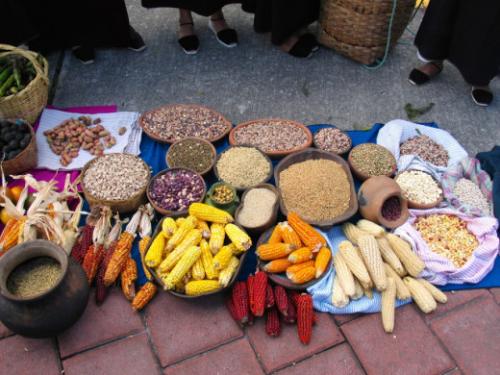Agroecology as antidote to GMO production
- Opinión

The present political and economic system seems to obey the logic of bacteria in a "Petri Dish," a flat glass container with nourishment for bacteria. When some species have a premonition that the nourishment is about to end, they enormously multiply, and then die.
Something like that, I think, is happening with the capitalist system. It is beginning to realize that, given the structural limits of natural resources, and having exceeded the ecological limits of the Earth, we already need more than of a planet and a half, (the equivalent of 1.6 planets), to meet human demands, in the future the conditions necessary for reproduction will no longer exist. And there is no alternative, as Pope Francis warned in his encyclical letter, Laudato Si, other than to change our modes of production and consumption and take care of our common home, the Earth.
Facing this scenario, what has been the reaction of productive and speculative capital? Like the bacteria of the "Petri Dish" they are exponentially multiplying the means of making a profit, accumulating ever more, and concentrating wealth in a frightful way. According to data published by the economist L. Dowbor in his 12-15-2015 site, dowbor.org: The World Network of Corporative Power, «only 737 principal actors, (top-holders), control 80% of the value of all transnational enterprises».
The economic, political and ideological power that hides behind this data is enormous. A worshiper of the money-idol, as Pope Francis said in the plane on his way back from Poland, the system is turning into «a true terrorism against humanity».
Is it not that the system, unconsciously, has the premonition, like the afore-mentioned bacteria, that it could disappear if it does not change? And is it attempting to change?
The reader must not think that this situation does not affect the seventh largest world economy, Brazil. It is characteristic of the «stupidity of the Brazilian intelligence», as Jesse Souza put it, to exclude this geopolitical data from the debates about impeachment and the national economy, such as for example has been done for years by the program, Globonews Panel. There, neoliberalism is supremely dominant. Ecology and social movements do not exist for that program.
This is the real problem: with the Labor Party, PT, Lula and Dilma the world system could not force Brazil to accept the concentrating logic of global capitalism. The people and the poor, it was said, earn too much, hurting the markets and the large national corporations together with the trans-nationals. Therefore, a coup against democracy had to be achieved, in any way possible, thus clearing the way for the monied classes to accumulate. The politics of Vice-President Temer are designed to totally undo the social policies of the Lula-Dilma governments. The Ministry of Agrarian Development has disappeared. The Secretariat of Solidarian Economy is now a department directed by a policeman.
But where there is power, there also arises a counter force. Everywhere in the world, the resistance to unsustainable capitalism, which has not brought good results even in the main capitalist countries, is growing.
In this context, agro-ecology enters, as an antidote. Organic production and agricultural cooperatives arise, without pesticides or genetically modified products.
From July 27 to 30 of 2016 in Lapa-Parana the 15ª Conferences of Agro-ecology were celebrated, with more than three thousand attendees from different regions of Brazil and seven other countries. The central theme was the preservation of native seeds, creating banks and houses of seeds, standing against the assault of the great corporations, such as Monsanto and Syngenta, among others. These corporations seek to make native seeds obsolete, and to force the peasants to buy their genetically modified seeds, that cannot reproduce and must be bought every year.
We know that seeds are a common good of humanity and must not be appropriated by private groups. The access to seeds is a basic human right, undermined by the few trans-nationals that in practice now control almost all seeds. For life to continue reproducing it is essential to defend the ecological, patrimonial and cultural wealth of seeds. Curiously, Cuba occupies first place in the world in agro-ecology, and in creating cooperatives in all spheres. That is how Socialism avoids being absorbed by individualist and concentrating capitalism.
It was moving to attend the "mystical" ending of the Conference, the exchange of seeds and seedlings among everyone present. There were many children, young people, Natives, women and men, who struggle for a sane life for all, against a system that is anti-life. They are the carriers of the hope that the world can be sane and flourish.
08-19-2016
- Leonardo Boff, Theologian-Philosopher, Earthcharter Commission
(Free translation from the Spanish sent by Melina Alfaro, alfaro_melina@yahoo.com.ar. Done at REFUGIO DEL RIO GRANDE, Texas, EE.UU.)
Del mismo autor
- O risco da destruição de nosso futuro 05/04/2022
- Reality can be worse than we think 15/02/2022
- ¿Hay maneras de evitar el fin del mundo? 11/02/2022
- Há maneiras de evitar o fim do mundo? 08/02/2022
- The future of human life on Earth depends on us 17/01/2022
- El futuro de la vida depende de nosotros 17/01/2022
- A humanidade na encruzilhada: a sepultura ou… 14/01/2022
- “The iron cage” of Capital 04/01/2022
- Ante el futuro, desencanto o esperanzar 04/01/2022
- Desencanto face ao futuro e o esperançar 03/01/2022
Clasificado en
Clasificado en:
Agroecología
- Isabelle Bourboulon 17/12/2020
- Sérgio Antônio Görgen 16/10/2020
- Javier Souza Casadinho 25/08/2020
- Pedro Stropasolas 05/06/2020
- Darío Aranda, et al 20/05/2020
